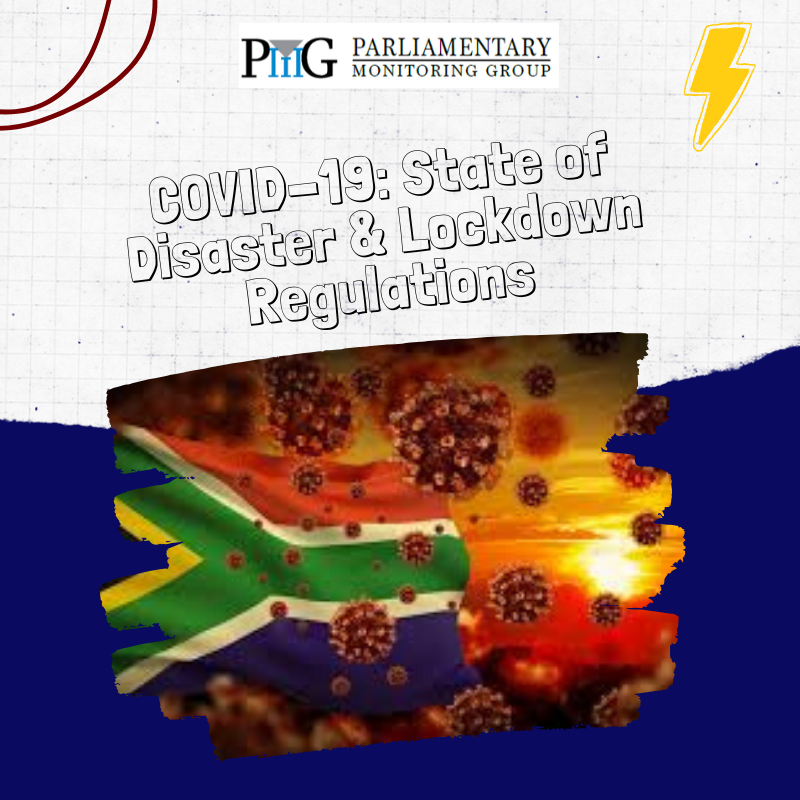COVID-19 State of Disaster & Lockdown: Update on 28 April 2020

Last Saturday, government called for input on a draft framework of economic sectors to be reactivated during each of the five Covid-19 lockdown alert levels announced last week by President Cyril Ramaphosa. Stakeholders were given until midday, Monday 27 April, to comment on the proposals, which will be fine-tuned for gazetting this week. Lockdown Level 4 is expected to begin on Friday, 1 May.
A Department of Cooperative Governance and Traditional Affairs presentation on 20 April to members of Cabinet throws light on:
- factors to be considered in determining the most appropriate alert level at any given time, nationally and, eventually, per province and district
- the strict return-to-work conditions that will apply as each sector is reactivated, including:
- generally applicable health and safety protocols
- sector-specific ‘Covid-19 prevention and mitigation plans’, approved by the Minister of Health and ‘any other Minister relevant to the sector’
- individual workplaces risk assessments and plans that should include:
- ‘worker education on Covid-19 and protection measures’
- the identification and protection of vulnerable employees
- safe transport arrangements
- ‘good’ workplace ventilation
- shift arrangements and canteen controls
- measures for managing sick employees, and
- rigorous monitoring systems.
Citizens ‘above the age of 60’ (especially those with ‘comorbidities’) will be:
- given a ‘work-from-home option’ or allowed to ‘remain on leave’, and
- their movement and social interaction ‘limited’.
Last Thursday, Finance Minister Tito Mboweni told media representatives at a briefing on the R500bn economic support package announced by President Cyril Ramaphosa that it will be funded:
- by way of ‘budget reallocations and re-prioritisations’ (which will be spelled out in a revised 2020 Budget to be tabled in Parliament ‘shortly’), and
- using resources ‘within the economic system’ to keep it ‘functioning’, including
- a national credit guarantee loan scheme for SMMEs to be launched this week
- ‘banking system’ and ‘insurance industry’ measures already either in place or being finalised, with the aim of supporting existing clients who might otherwise have been ‘disadvantaged’ by the Covid-19 lockdown, and
- the additional tax relief measures announced last week by the President, which will be included in two revised draft disaster management Bills to be released on 30 April for comment.
Courts
A directive on the management of SA’s courts during the Covid-19 lockdown was gazetted last week, confirming that:
- bail applications fall under the category of matters deemed ‘urgent’ in the 31 March directive issued by Justice and Correctional Services Minister Ronald Lamola
- ‘only urgent applications and urgent matters arising from the activities associated with disaster management may be heard in open court during the lockdown period’
- all criminal trials have been postponed until the lockdown has been lifted
- all civil trials have been removed from the court roll and will be re-enrolled after the lockdown.
Financial institutions
The Prudential Authority, Financial Sector Conduct Authority and the SARB issued a joint communication spelling out the financial intelligence reporting and intervention obligations of accountable institutions during the Covid-19 international pandemic. Among other things, the communication reminded accountable institutions of the 15 May deadline for submitting ‘detailed plans’ for dealing, post-lockdown, with ‘high- and medium-risk customers’.
Mining
A Department of Mineral Resources media statement added several new requirements to the list included in 16 April amendments to the Covid-19 disaster management regulations. The new requirements are understood to be in keeping with sub-section 5(1) of the 1996 Mine Health and Safety Act. Before mining activities are resumed:
- companies will be expected to develop suitable procedures, ‘in consultation with labour unions’, including:
- protocols to ensure ‘adequate social distancing’
- ‘personal hygiene programmes’
- ‘appropriate personal protective equipment, including face masks’ for all employees, and
- arrangements for ‘systematically phasing in workers at the mines’.
SANDF
All available SANDF reservists, with and without ‘specialist skills’, were asked to contact their units in anticipation of being deployed when required. ‘Certain reserve force units and selected individuals’ are now ‘on 25 hours standby’. These moves follow President Cyril Ramaphosa’s decision to ‘employ an additional 73,180 members of the SANDF’ to assist with measures to curb the spread of Covid-19.
Prepared by Pam Saxby
See prior blogs:
COVID-19 State of Disaster & Lockdown Regulations: Update
COVID-19 State of Disaster & Lockdown Regulations: A summary
About this blog

"That week in Parliament" is a series of blog posts in which the important Parliamentary events of the week are discussed.
We host the latest posts of this blog, written by People's Assembly. You can find more on PA's blog.
About this blog

"That week in Parliament" is a series of blog posts in which the important Parliamentary events of the week are discussed.
We host the latest posts of this blog, written by People's Assembly. You can find more on PA's blog.
